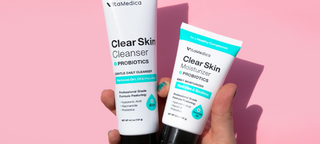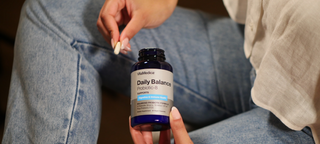Blog
-

Top 10 Natural Healing Ingredients
From the turmeric fields of India to the pineapple orchards of Indonesia, here are 10 of our planet’s most powerful natural wellness ingredients, and how to harness their benefits.
-

Peaceful, Easy Eating: How Whole Nutrition Can Combat Stress
Diet and stress are closely linked. Learn which foods can help with stress relief, and which foods could spell trouble for your mood.
-

How Does Stress Affect Skin Health?
Stress can show up in a variety of ways on our skin. From triggering breakouts and rashes to worsening existing skin conditions, here’s everything you need to know about the stress-skin...
-

12 Fast Fixes to Reduce Your Food Waste
Is half of your grocery haul going to waste each week? Give these 12 tips for reducing food waste a try– your bank account will thank you. And, perhaps, so...
-

Listen to Your Gut: 10 Gut Health Red Flags & What to Do About Them
If your gut health were out of balance, would you know how to spot the signs? Gut health is linked to every system in our body, impacting overall wellbeing, but issues...
-

The Ultimate Guide to Beating Burnout: 7 Tips to Help You Reenergize, Rebalance, and Restore
If we’re not careful, chronic stress can become a more serious problem: burnout. Learn to prevent, recognize, and overcome the effects of long-unchecked stress with these actionable tips for beating burnout.
-

Bromelain and Quercetin: Balance the Natural Inflammatory Response
Inflammation is the body’s natural reaction to tissue damage. But despite your body’s healing efforts, inflammation can be unsightly and painful. This can be especially true in sensitive or frequently...
-

Trader Joe's 10 Minute Stuffed Avocado Recipe
It can be hard to squeeze in lunch during a busy work day, study session, or between playdates, but it is essential to fuel your body. Meal planning makes it easy...
-

Staying Healthy on a Budget: 10 Tips for Eating Well Without Breaking the Bank
Build healthy habits and reach your nutritional goals with ten helpful tips for healthy eating on a budget. Check out these 10 fun, simple tips to better nourish your body,...
-

Topicals: The Best Probiotics for Acne?
Using probiotics to combat acne and other inflammatory skin conditions is a recent treatment trend. But, while we know that taking a probiotic supplement can be effective, what about putting...
-

How to Prevent Bruising After Botox & Fillers
Have you received Botox or Juvederm and experienced bruising after the treatment? Or, are you scheduled for Radiesse or Sculptra and worried that you might bruise after these dermal fillers?...
-

Diet Tips for Weight Loss - 20 Tips to Help You Lose Weight
Over unrealistic advice and fad diets that just don’t work? We’ve put together our 20 best science-backed diet tips to help you lose weight and keep it off for good!...












